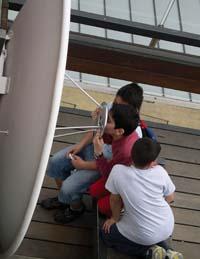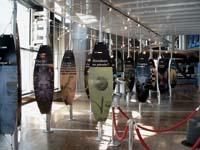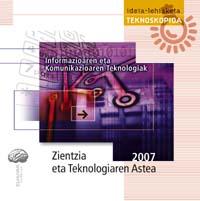Science and technology in hand

Science and technology have a great influence on today's society and on the lifestyle. The novelties and advances of recent years have meant an important and relatively rapid change. But, paradoxically, for a large part of society science and technology are distant and almost incomprehensible, if they are not boring.
It is not easy to know exactly why this happens, because people do not feel satisfied with the fruits of science, or because the scientific and technological community does not do enough to socialize their jobs.
In 2000, the first Science Week was organized, on the initiative of the European Union, to change this situation. The aim is to bring science and technology closer to the public, bring out the latest advances and research work, and awaken people's curiosity for science. At the CAPV, Innobasque organizes the Science and Technology Week. Innobasque --until recently Saret-- is the Basque Network of Science, Technology and Innovation, which brings together all the agents involved in the field of science and technology in the ACBC.
Information and communication technology

If something relates science to society, this is technology, which basically consists of applying scientific knowledge to facilitate human activities. This year's Science and Technology Week has influenced technology. And this year's theme is "Information and Communication Technologies", or what is the same, ICTs.
They may not be well known by their name, but ICTs have a great prominence in today's life and most of us use them daily. These three letters collect many things. In short, ICTs are all technologies that allow the collection and transmission of information --communication - and the use of this information in different ways: radiotelevisions, mobile phones, computers, internet...
Information is essential for the human being. All our activity is conditioned by the information we receive constantly through the senses. Decision-making depends on the information we have. However, at present the information has become more important than ever due to the existing facilities for its exchange, that is, for its communication. Many times we hear that we live in the information society, and if that is so, it is largely thanks to ICTs. ICTs and, above all, the Internet, are radically changing society, and their precious gold is information.
The amount of information available thanks to ICTs is huge. Radio Televisión and Internet are the most important sources, but there are also CDs and DVDs. On the other hand, through computers and software we can use and process this information in different ways. And we can store a lot of information on very small media. Imagine thanks to mp3 players in a pocket of 20,000 songs -- about 2,000 discs -- or smaller devices with more megas and gigas. We also carry the phones in our pocket. Mobile phones, along with e-mail, have become almost essential for personal communications.
Computers are the brain and heart of ICTs, but undoubtedly the most important and revolutionary element of ICTs is the Internet, especially its last generations: the Web 2.0 is formed by network services based on the participation and exchange of information of the people; and the wikis that have been so successful and are blogs, among other stars 2.0.

And it's a blog that participants have had to do in this year's 'Teknoskopioa 2007' ideas competition. Teknoskopioa is an idea contest organized by Elhuyar Fundazioa, Innobasque and kutxaScience Space within the Science and Technology Week. Students of Baccalaureate and Vocational Training had to choose an interesting topic or provoke debate, any topic related to science or technology. But the topic had to be very interesting, as it had to generate debate and get people to think about the blog.
In addition to Teknoskopioa, for several days, eleven other events will be held around ICTs. This year, at least, it cannot be said that the issue is not close, according to data from the Eustat, 65% of the population aged 15 and older of the CAPV has a computer, 92% mobile phone and 88% of young people aged 15 to 24 are internet users. These are significant percentages, if reflected in the Science and Technology Week.
Buletina
Bidali zure helbide elektronikoa eta jaso asteroko buletina zure sarrera-ontzian











